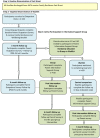The Child Illness and Resilience Program (CHiRP): a study protocol of a stepped care intervention to improve the resilience and wellbeing of families living with childhood chronic illness
- PMID: 25945251
- PMCID: PMC4416421
- DOI: 10.1186/2050-7283-2-5
The Child Illness and Resilience Program (CHiRP): a study protocol of a stepped care intervention to improve the resilience and wellbeing of families living with childhood chronic illness
Abstract
Background: Families of children living with chronic illness are more vulnerable to mental health problems, however this can be ameliorated by a family's resilience. The Child Illness and Resilience Program (CHiRP) will develop and evaluate a parent-focussed family intervention designed to increase the resilience and wellbeing of families living with childhood chronic illness.
Methods/design: The study will be conducted in an Australian regional paediatric hospital and will use a stepped care intervention that increases in intensity according to parental distress. All parents of children discharged from the hospital will receive a family resilience and wellbeing factsheet (Step 1). Parents of children attending selected outpatient clinics will receive a family resilience and wellbeing activity booklet (Step 2). Parents who receive the booklet and report psychological distress at three-month follow-up will be randomised to participate in a family resilience information support group or waitlist control (Step 3). The Step 3 control group will provide data to compare the relative effectiveness of the booklet intervention alone versus the booklet combined with the group intervention for distressed parents. These participants will then receive the information support group intervention. All parents in Step 2 and 3 will complete baseline, post-intervention and six month follow up assessments. The primary outcomes of the study will be changes in scores between baseline and follow-up assessments on measures of constructs of family resilience, including parental wellbeing, family functioning, family beliefs and perceived social support. Qualitative feedback regarding the utility and acceptability of the different intervention components will also be collected.
Discussion: It is hypothesised that participation in the CHiRP intervention will be associated with positive changes in the key outcome measures. If effective, CHiRP will provide an opportunity for the health sector to deliver a standardised stepped care mental health promotion intervention to families living with childhood chronic illness.
Trial registration: Australian clinical Trials Registry ACTRN 12613000844741 Universal Trial Number (UTN): 1111-1142-8829.
Keywords: Childhood chronic illness; Evaluation; Family functioning; Family intervention; Family resilience; Parental wellbeing; Social support.
Figures
Similar articles
-
Family Talk versus usual services in improving child and family psychosocial functioning in families with parental mental illness (PRIMERA-Promoting Research and Innovation in Mental hEalth seRvices for fAmilies and children): study protocol for a randomised controlled trial.Trials. 2021 Apr 1;22(1):243. doi: 10.1186/s13063-021-05199-4. Trials. 2021. PMID: 33794971 Free PMC article.
-
A Capacity Building Program to Improve the Self-Efficacy of Key Workers to Support the Well-Being of Parents of a Child With a Disability Accessing an Early Childhood Intervention Service: Protocol for a Stepped-Wedge Design Trial.JMIR Res Protoc. 2019 Apr 3;8(4):e12531. doi: 10.2196/12531. JMIR Res Protoc. 2019. PMID: 30942699 Free PMC article.
-
Building the capacity of family day care educators to promote children's social and emotional wellbeing: an exploratory cluster randomised controlled trial.BMC Public Health. 2011 Nov 3;11:842. doi: 10.1186/1471-2458-11-842. BMC Public Health. 2011. PMID: 22047600 Free PMC article. Clinical Trial.
-
Development of a theory-based family resilience intervention program for parents of children with chronic diseases: A Delphi study.J Pediatr Nurs. 2024 Jan-Feb;74:41-50. doi: 10.1016/j.pedn.2023.11.020. Epub 2023 Nov 22. J Pediatr Nurs. 2024. PMID: 37995476 Review.
-
A review of the relationship between mental health, wellbeing and drought resilience in rural, regional and remote communities.Front Psychiatry. 2025 May 26;16:1528573. doi: 10.3389/fpsyt.2025.1528573. eCollection 2025. Front Psychiatry. 2025. PMID: 40491681 Free PMC article. Review.
Cited by
-
Family Resilience Scale Short Form (FRS16): Validation in the US and Chinese Samples.Front Psychiatry. 2022 May 13;13:845803. doi: 10.3389/fpsyt.2022.845803. eCollection 2022. Front Psychiatry. 2022. PMID: 35633805 Free PMC article.
-
Examination of Transition Readiness, Medication Adherence, and Resilience in Pediatric Chronic Illness Populations: A Pilot Study.Int J Environ Res Public Health. 2020 Mar 15;17(6):1905. doi: 10.3390/ijerph17061905. Int J Environ Res Public Health. 2020. PMID: 32183424 Free PMC article.
-
"I sort of never felt like I should be worried about it or that I could be worried about it'" an interpretative phenomenological analysis of perceived barriers to disclosure by young people with coeliac disease.Br J Health Psychol. 2022 Nov;27(4):1296-1313. doi: 10.1111/bjhp.12599. Epub 2022 May 16. Br J Health Psychol. 2022. PMID: 35574996 Free PMC article.
-
Improving health, wellbeing and parenting skills in parents of children with special health care needs and medical complexity - a scoping review.BMC Pediatr. 2019 Aug 30;19(1):301. doi: 10.1186/s12887-019-1648-7. BMC Pediatr. 2019. PMID: 31470820 Free PMC article.
-
Statistical design and analysis in trials of proportionate interventions: a systematic review.Trials. 2019 Feb 28;20(1):151. doi: 10.1186/s13063-019-3206-x. Trials. 2019. PMID: 30819224 Free PMC article.
References
-
- AIHW . A picture of Australia's children. Canberra: Australian Institute of Health and Welfare; 2012.
-
- Barlow J, Cullen-Powell L, Cheshire A. Psychological well-being among mothers of children with cerebral palsy. Early Child Dev Care. 2006;176(3–4):421–428. doi: 10.1080/0300443042000313403. - DOI
Pre-publication history
-
- The pre-publication history for this paper can be accessed here: http://www.biomedcentral.com/2050-7283/2/5/prepub
LinkOut - more resources
Full Text Sources
Other Literature Sources


